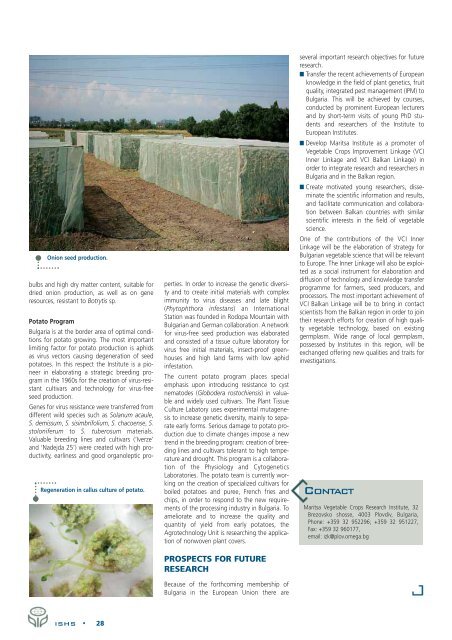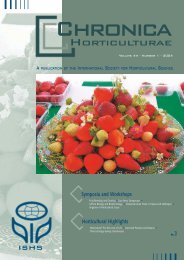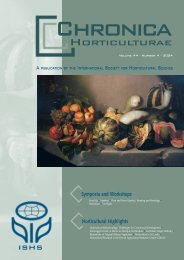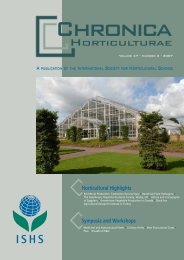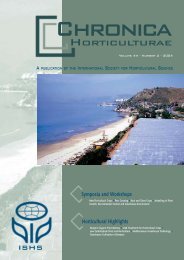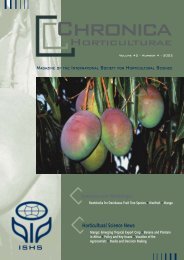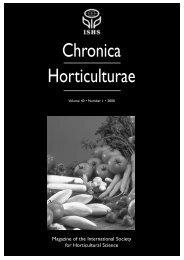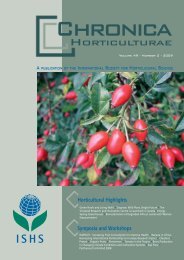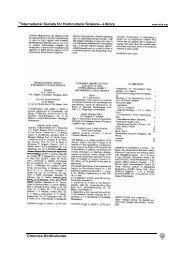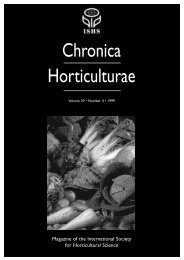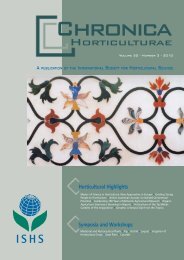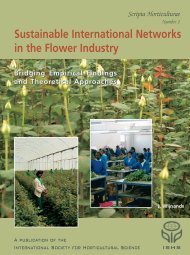Chronica - Acta Horticulturae
Chronica - Acta Horticulturae
Chronica - Acta Horticulturae
You also want an ePaper? Increase the reach of your titles
YUMPU automatically turns print PDFs into web optimized ePapers that Google loves.
Onion seed production.<br />
bulbs and high dry matter content, suitable for<br />
dried onion production, as well as on gene<br />
resources, resistant to Botrytis sp.<br />
Regeneration in callus culture of potato.<br />
Potato Program<br />
Bulgaria is at the border area of optimal conditions<br />
for potato growing. The most important<br />
limiting factor for potato production is aphids<br />
as virus vectors causing degeneration of seed<br />
potatoes. In this respect the Institute is a pioneer<br />
in elaborating a strategic breeding program<br />
in the 1960s for the creation of virus-resistant<br />
cultivars and technology for virus-free<br />
seed production.<br />
Genes for virus resistance were transferred from<br />
different wild species such as Solanum acaule,<br />
S. demissum, S. sisimbrifolium, S. chacoense, S.<br />
stoloniferum to S. tuberosum materials.<br />
Valuable breeding lines and cultivars (‘Iverze’<br />
and ‘Nadejda 25’) were created with high productivity,<br />
earliness and good organoleptic properties.<br />
In order to increase the genetic diversity<br />
and to create initial materials with complex<br />
immunity to virus diseases and late blight<br />
(Phytophthora infestans) an International<br />
Station was founded in Rodopa Mountain with<br />
Bulgarian and German collaboration. A network<br />
for virus-free seed production was elaborated<br />
and consisted of a tissue culture laboratory for<br />
virus free initial materials, insect-proof greenhouses<br />
and high land farms with low aphid<br />
infestation.<br />
The current potato program places special<br />
emphasis upon introducing resistance to cyst<br />
nematodes (Globodera rostochiensis) in valuable<br />
and widely used cultivars. The Plant Tissue<br />
Culture Labatory uses experimental mutagenesis<br />
to increase genetic diversity, mainly to separate<br />
early forms. Serious damage to potato production<br />
due to climate changes impose a new<br />
trend in the breeding program: creation of breeding<br />
lines and cultivars tolerant to high temperature<br />
and drought. This program is a collaboration<br />
of the Physiology and Cytogenetics<br />
Laboratories. The potato team is currently working<br />
on the creation of specialized cultivars for<br />
boiled potatoes and puree, French fries and<br />
chips, in order to respond to the new requirements<br />
of the processing industry in Bulgaria. To<br />
ameliorate and to increase the quality and<br />
quantity of yield from early potatoes, the<br />
Agrotechnology Unit is researching the application<br />
of nonwoven plant covers.<br />
PROSPECTS FOR FUTURE<br />
RESEARCH<br />
Because of the forthcoming membership of<br />
Bulgaria in the European Union there are<br />
several important research objectives for future<br />
research.<br />
■ Transfer the recent achievements of European<br />
knowledge in the field of plant genetics, fruit<br />
quality, integrated pest management (IPM) to<br />
Bulgaria. This will be achieved by courses,<br />
conducted by prominent European lecturers<br />
and by short-term visits of young PhD students<br />
and researchers of the Institute to<br />
European Institutes.<br />
■ Develop Maritsa Institute as a promoter of<br />
Vegetable Crops Improvement Linkage (VCI<br />
Inner Linkage and VCI Balkan Linkage) in<br />
order to integrate research and researchers in<br />
Bulgaria and in the Balkan region.<br />
■ Create motivated young researchers, disseminate<br />
the scientific information and results,<br />
and facilitate communication and collaboration<br />
between Balkan countries with similar<br />
scientific interests in the field of vegetable<br />
science.<br />
One of the contributions of the VCI Inner<br />
Linkage will be the elaboration of strategy for<br />
Bulgarian vegetable science that will be relevant<br />
to Europe. The Inner Linkage will also be exploited<br />
as a social instrument for elaboration and<br />
diffusion of technology and knowledge transfer<br />
programme for farmers, seed producers, and<br />
processors. The most important achievement of<br />
VCI Balkan Linkage will be to bring in contact<br />
scientists from the Balkan region in order to join<br />
their research efforts for creation of high quality<br />
vegetable technology, based on existing<br />
germplasm. Wide range of local germplasm,<br />
possessed by Institutes in this region, will be<br />
exchanged offering new qualities and traits for<br />
investigations.<br />
CONTACT<br />
Maritsa Vegetable Crops Research Institute, 32<br />
Brezovsko shosse, 4003 Plovdiv, Bulgaria,<br />
Phone: +359 32 952296; +359 32 951227,<br />
Fax: +359 32 960177,<br />
email: izk@plov.omega.bg<br />
ISHS • 28


